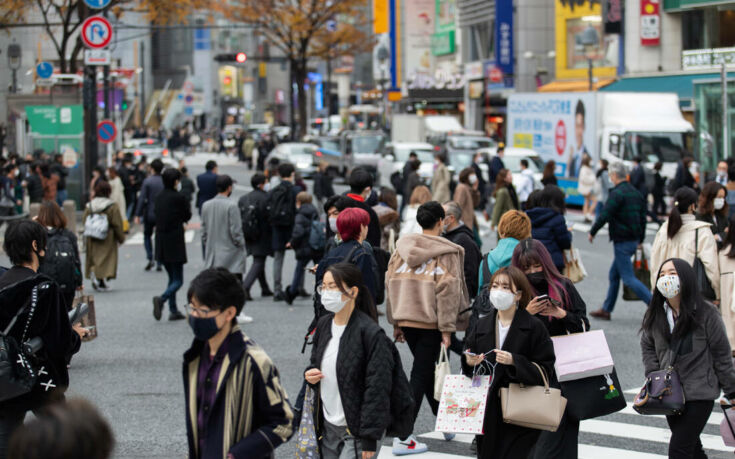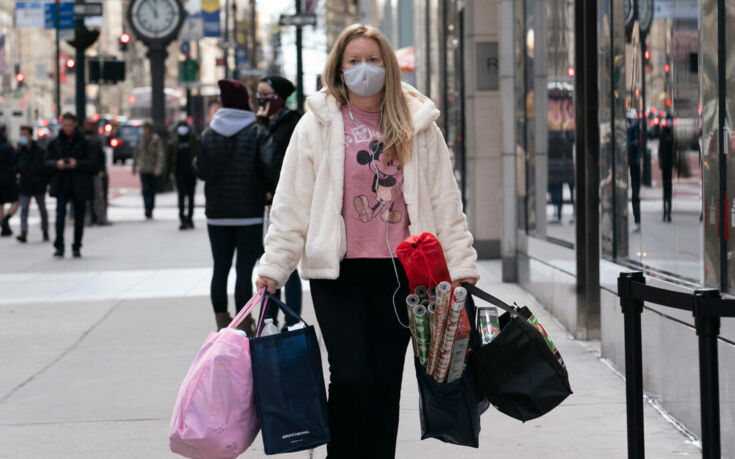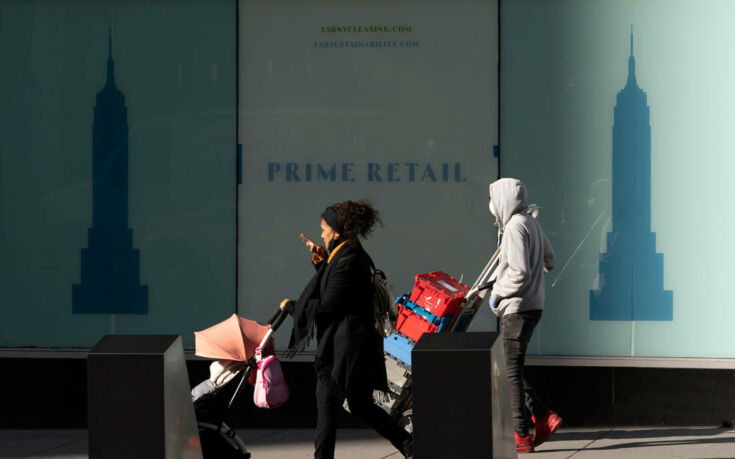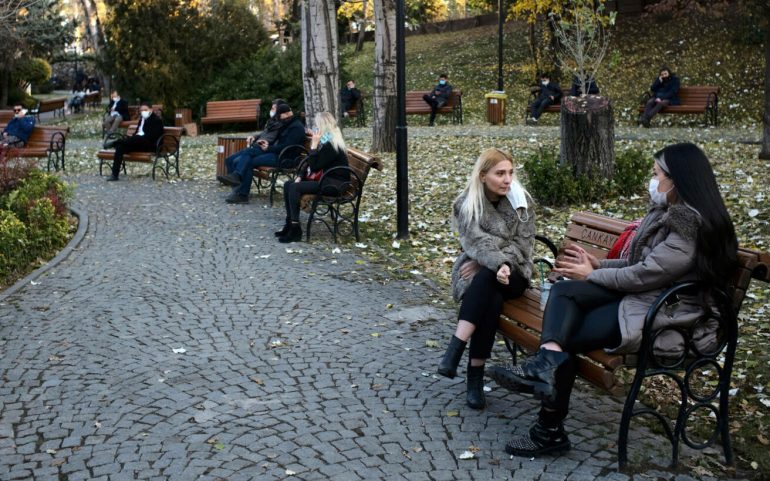"Forget what you knew until today because we are entering a new era." This supports in his extensive article on RT ο Slavoi Zizek regarding the consequences - physical, financial, social and psychological - which already leaves behind the pandemic of Covid-19.
Ο cultural philosopher, Professor at New York University and director of the Birkbeck Institute at the University of London, believes that "it is time to accept that the pandemic of coronavirus changed the way we existed forever. "Now the human species must embark on a course of enormous difficulty that will lead to the decision of what this 'new normality' will be."
The planet has lived with the pandemic for most of 2020. But what is the situation today, in early December, in the midst of what European media call the "second wave"? First of all, let us note that the distinction between the first and second waves is mainly focused on Europe because in Latin America the virus followed a different path: it peaked between the two European waves and now, as Europe suffers from the second wave, the situation in Latin America "it started to improve a bit," says the Slovenian philosopher.
"We also have to keep in mind the differences in the way we do it the pandemic affects so many different classes (the poor have been hit hardest), as well as different races (In the US, blacks and Latins have suffered much more) but also the different sexes. And we need to focus especially on countries where the situation is so bad - because of war, poverty, hunger and violence - that the pandemic is considered the least bad. For example, Yemen. As the Guardian wrote, "In a country plagued by disease everywhere, coronavirus cases are being recorded by force. "War, famine and catastrophic cuts in humanitarian aid have left the situation for the people of Yemen lifeless." The same happened during the brief war between Armenia and Azerbaijan, when the pandemic became secondary. "Nevertheless, despite these complications, there are some general observations that we can make by comparing the second wave with the peak of the first wave," he writes.

As Zizek notes, "in the beginning, some of our hopes have already been dashed: Herd immunity does not seem to work, "Deaths are still at record levels in Europe, shattering any hope of a milder form of the virus."
"We are also dealing with many unknown parameters, especially in relation to how the coronavirus spreads. In some countries, this pressure has led to the search for some "culprits", such as in private home gatherings and workplaces. "The phrase we often hear, that we must 'learn to live with the virus', essentially expresses their 'capitulation' to this enemy," he points out.
"Although vaccines raise hopes, we should not expect them to magically put an end to all problems and return to normalcy. "Will the distribution of vaccines be the greatest moral test: will the principle of universal distribution, which will cover all of humanity, survive or be dissolved in opportunistic compromises?" The Slovenian philosopher rightly wonders.
Zizek also claims that "the limitations of the model followed by many countries are becoming increasingly apparent - especially those aimed at striking a balance between fighting the pandemic and surviving the economy. The only thing that seems to really work is the extreme lockdown. In the Australian state of Victoria, for example, there were 700 new cases a day in August, but in late November, Bloomberg reported that "28 days passed without new cases, an enviable record as the US and many European countries struggle with the increase of cases and the constantly new lockdowns ".
"In terms of mental health, today we can say, in retrospect, that people's reaction to the peak of the first wave was natural and healthy, in the face of the threat as they focused on avoiding contamination. It was as if they did not have time to deal with any mental problems. Although we now talk widely about mental health problems, the predominant way people react to the pandemic is a mixture of heterogeneous elements. Although there is an increase in infections, in most countries the pandemic has not been taken very seriously - and in some cases even the strange logic of "life just goes on" prevails. "Many in Western Europe are worried about whether they will be able to celebrate Christmas and go shopping, or whether they will be able to take a winter break."

"However, this view of 'life goes on' - perhaps an indication that we have somehow learned to live with the virus - is rather the opposite of how we would have calmed down if the worst was over. This position contains equal despair, violations of state regulations and strong protests against them. And since there is no clear perspective on the horizon, something deeper than that works here fear: the Depression. We feel fear when there is a clear threat and frustration when obstacles arise again and again and prevent us from achieving what we so desire. But depression is a sign that our desire is disappearingZizek emphasizes meaningfully, adding:
"The feeling of this disorientation is created by the fact that the clear relationship between cause and effect has been disturbed so far. In Europe, for reasons that remain unclear, the number of infections is declining in France and increasing in Germany. Without knowing why, countries that until two months ago were considered role models in dealing with the pandemic, today are its worst victims. "Scientists are examining various hypotheses, but this fact also makes the sense of confusion even stronger and further contributes to the mental crisis", he notes.
"This disorientation grows even bigger than the mixture of different levels that characterizes the pandemic. Cristiano Drosten, the leading German virologist, stressed that the pandemic is not just a scientific or health phenomenon, but a natural disaster. And here one must add that it is also a social, economic and ideological phenomenon.
We also have the impact of the pandemic on the economy, says Zizek: "In the Western Balkans, hospitals have exceeded the limits. A doctor in Bosnia said "one of us can do the work of three, but not five people". According to France24, one cannot understand the crisis without remembering "the brain drain crisis, the voluntary departure of many promising young doctors and nurses who left their countries in search of better per diems abroad". Therefore, the catastrophic effects of the pandemic are clearly caused by the migration of the labor force ".

So we can, according to the Slovenian philosopher, safely conclude that one thing is certain: "If the pandemic really proceeds in three waves, the general character of each wave will be clearly different. The first wave focused our attention, of course, on health issues and how we can prevent the virus from spreading beyond tolerable levels. That is why most countries have accepted quarantine and social distance. Although the number of infections is much higher in the second wave, the fear of long-term economic consequences continues to grow. And if the vaccines do not stop the third wave, it is certain that this will focus mainly on mental health, on the catastrophic consequences of the disappearance of what we consider "normal social life". That is why I believe that even if the vaccines work well, the mental and psychological crisis will persist ".
«The top question we face is this: should we really try at all costs to return to our old normalcy? "Or should we accept that the pandemic is one of the signs that we are entering a 'post-human' age ('post-human' based on a sense of what it means to be human)?" this is clearly a choice that does not only concern our mental health, but is in a way an ontological choice that concerns our overall relationship with what we experience as reality. "
Conflicts over how best to deal with the pandemic are not conflicts between different medical views, they are serious existential conflicts, Zizek says.
"That's how Brendan Dillie, a Texas showman, refuses to wear a mask: 'Better dead than a sucker,'" better to die than look like an idiot. " Dilly refuses to wear a mask because, according to him, "walking around wearing a mask is incompatible with fundamental human dignity." So what is our fundamental attitude towards human life? Are we, like Dili, liberals who reject any violation of our personal freedoms? are we ready to sacrifice thousands of lives for the financial well-being of the majority? are we authoritarian who believe that only very strict state control and state regulation can save us? are we new age spiritualists who consider the pandemic a "warning of nature or our punishment for overexploiting natural resources"? Each of these positions is based on a specific view of human nature. "It has to do with the level that, in a way, we are all philosophers," Zizek said.
Given this, the Italian philosopher Giorgio Agaben, in a recent article, argues that "if we take action against the pandemic, we automatically leave the social space as the core of our human condition, and become isolated survival machines, controlled by science and technology, as well as servants of the respective state power. So, even when our homes are on fire, we must find the courage to go on with our lives as if nothing were going on and eventually die with dignity. The Italian writes: "None of what I do makes sense when the house is on fire. And yet, even when the house is on fire, it is necessary to continue as we did before, to do everything with care and precision, maybe even more than before, even when no one is watching us. Maybe life itself disappears from the face of the Earth, maybe no memory is left of what happened, whatever that means. But you continue as before, it is too late to change, because there is no more time ".

Does this mean, the Slovenian philosopher wonders, that "if we disagree with Agaben, we should simply give in to the loss of humanity and forget our usual social freedoms?" "Even if we ignore the fact that these freedoms are in fact much more limited than they seem, the paradox is that simply by going through the zero point of this disappearance, we can keep room open for any new freedoms to come."
"If we stick to our old way of life, we will surely end up in a new barbarity", Zizek clearly supports.
"In the United States and Europe, the 'young barbarians' are the ones who are violently protesting against the pandemic in the name of personal freedom and dignity - people like Donald Trump's son-in-law, Jared Kouchner, who in April boasted that "Trump is 'liberating the country from the doctors,' that is, the only ones who can help us!"
However, it is worth noting that in the last paragraph of his text, Agaben leaves open the possibility for a new post-human spirituality to emerge.
"Today," writes the Italian, "the human species is disappearing, like a face painted in the sand blown away by the waves." But what takes its place is a naked and dumb life without history, at the mercy of the calculations of power and science. "Perhaps, again, only through this impending shipwreck can something else appear, either slowly or suddenly - certainly not a god but not another human being - perhaps another animal, a soul that lives in a different way."
"Agaben here alludes to the famous paragraph from Foucault's 'Les mots et les choses', which refers to the human race, which disappears like a face carved in the sand by the waves of the coast. As a result, we are already entering an era that can be called "post-human". "The pandemic, global warming and the digitization of our lives are eroding the basic coordinates of our humanity," said the Slovenian philosopher.
I will give you a clue: against the use of a protective mask, Agaben refers to the French philosopher Emanuel Levina, and his view that the person "speaks to me and therefore invites me to a relationship disproportionate to the power exercised." Agaben's conclusion is that by making the human face invisible, the mask makes invisible the very invisible abyss that resonates with the human face. There is a clear Freudian answer to this assertion: Sigmund Freud knew very well why in an analytical session the patient and the analyst do not face each other. "The face is, at its core, a lie, the supreme mask, and the analyst can only enter the abyss of the Other only WITHOUT seeing his face," he notes.
"Accepting the invitation of this 'post-humanity' is our only hope. Instead of dreaming of a return to the old normalcy, we have to get involved in the difficult and painful process of building a new regularity. This construction is neither a medical nor a financial issue. "It is a deeply political issue: we have to invent a new form of our whole social life," Zizek concludes meaningfully.
